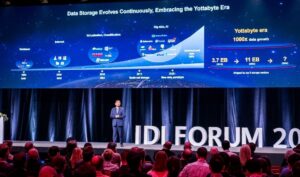
The 2023 Innovative Data Infrastructure Forum: Envisioning the Yottabyte Era
MUNICH, May 26, 2023 — The 2023 Innovative Data Infrastructure Forum (IDI Forum) was held in Munich, Germany on May 23, centered on the theme “New Apps ∙ New Data ∙ New Resilience.” This forum draws global industry specialists and partners to envision the digital infrastructure of the future, moving into the yottabyte era (one yottabyte equals a quadrillion gigabytes). Huawei covered various topics at the forum, including leveraging the emerging application ecosystem, managing large amounts of unstructured data efficiently, and enhancing data resilience holistically. The aim was to unlock the potential of data and drive the evolution of the data storage industry.
Huawei believes data storage faces major changes and great opportunities as digital transformation deepens:
To begin with, a significant 56% of businesses are deploying AI applications, and an overwhelming 96% plan to create cloud-native applications to cope with evolving data applications. Moreover, data growth is experiencing an exponential surge, with 80% of new data being unstructured, showing a compound annual growth rate (CAGR) of 38%. Lastly, data resilience is under intense pressure. Ransomware is continually evolving, and the incidence of ransomware attacks is increasing at a staggering annual rate of 98%. Worryingly, more than 14% of businesses fail to recover their data after a ransomware attack.
Emerging big data and AI applications pose higher requirements on the parallel processing of diversified data. The collaboration model between data storage and data applications is being reconstructed to embrace new data paradigms. Cloud-native applications are becoming more prevalent in enterprise data centers. To tackle these challenges, reliable and high-performance container storage will be a necessity.
As unstructured data used for production and decision-making systems becomes increasingly hot due to real-time access, the read/write bandwidth and I/O access efficiency of scale-out storage need to be significantly improved. To meet the need for cost-effective storage of mass unstructured data, innovations in software, hardware, and algorithms are crucial for scale-out storage. In addition, with the explosion in data volume, severe data gravity challenges arise. Therefore, intelligent data fabric is required to implement global data view and unified data scheduling across systems, regions, and clouds.
Data resilience threats are evolving from natural disasters and physical damages to human-factor disasters such as ransomware. Hence, a shift from reactive response to proactive defense is critical to ensure higher data resilience. The surge in zero-day vulnerabilities and huge losses caused by unrecoverable data reveal the inadequacy of the current enterprise data resilience system. Such a system consists of networks, applications, and hosts, and is no longer adequate for meeting the latest data resilience requirements of enterprises. Data storage is becoming the last line of defense for data resilience, with more resilience features being integrated into data storage products, including ransomware detection, data encryption, secure snapshots, and data recovery in Air Gap.
Dr. Zhou remarked in his speech that Huawei Data Storage provides an extensive range of products and solutions to meet our customers’ and partners’ evolving requirements. OceanStor Dorado All-Flash Storage and OceanStor Pacific Scale-Out Storage were all recognized as a 2023 Customers’ Choice in Gartner Peer InsightsTM.
To see the bigger picture of the data storage industry, consider that in 2022, the combined shipment volume of the world’s top five External Controller-Based (ECB) storage vendors was triple the volume in 2012. Despite this increase, it’s still not sufficient to satisfy the demands of the forthcoming yottabyte era. Huawei projects that this figure will multiply ten times by 2032, surpassing 100 exabytes. To truly exploit the potential of massive data, storage solutions should not only focus on capacity and performance but also promote new data paradigms, intelligent data fabric, and inherent data resilience. This approach will foster the rapid advancement of the data storage industry.
Source: Huawei































